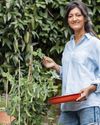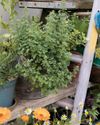
Before we begin, let me first say that I am not your typical green-fingered grower who picks lush tomatoes from her garden and harvests rows of rhubarb and competitive giant squashes. I squeal at the sight of slugs and confess to having thrown out a beautiful flowerpot after spotting some kind of movement in the compost. I also don't have the outdoor space to even consider becoming the next Monty Don. But as a lover of food, and not just any food but seasonal food that's grown for maximum flavour, I have succumbed to the joys of growing my own indoors. I love vegetables, herbs and edible flowers.
Most of my fruit and veg - peppers, pears, apples, spinach, tomatoes and many more - come from my organic veg box, the grocer (especially for plantains and scotch bonnet chillies) and local farm shops. But the very best microgreens, herbs and leafy greens I have ever enjoyed have been those that I have grown at home, indoors and on my windowsill - full of flavour, crunch and fragrance. With just a few tips and tricks even drab and sad herbs from the supermarket can be transformed.
While many of us live without outdoor space, growing crops indoors and on your windowsills is much easier than it seems. Growing your own food can also be rewarding, from the cost-saving benefits to the sense of pride in nurturing these living things from plant to plate.
From my slug-hating perspective, the best crops to grow indoors are herbs, and salad leaves such as lettuce and microgreens. I find herbs can take quite a long time to germinate from seed; some take a week or more and others much longer, and it's only months later before there are enough leaves available for you to start enjoying them frequently. I much prefer buying baby herb plants from good nurseries and nurturing them into well-established plants, then propagating them to flourish in multiple plant pots.
This story is from the {{IssueName}} edition of {{MagazineName}}.
Start your 7-day Magzter GOLD free trial to access thousands of curated premium stories, and 9,000+ magazines and newspapers.
Already a subscriber ? Sign In
This story is from the {{IssueName}} edition of {{MagazineName}}.
Start your 7-day Magzter GOLD free trial to access thousands of curated premium stories, and 9,000+ magazines and newspapers.
Already a subscriber? Sign In

A new plot for tasty crops
Taking on a new allotment needn't be hard work. By simply following a few easy tips you can have bumper crops in no time, just like Alessandro Vitale

We love July
July is an island floating between the joy of June and the slightly fatigued month of August. It's a grown-up month: the year has shrugged off its adolescent exuberances, the weather is (hopefully) warm enough for ice cream to be one of your five a day, the sea should be swimmable without (too much) danger of hypothermia and thoughts will be of holiday shenanigans and family barbecues. School's out this month, the next tranche of glorious summer colour is washing across our borders and it's my birthday. Lots of reasons to give three rousing cheers for July!

YOUR PRUNING MONTH
Now, at the height of summer, Frances Tophill shows how to boost your plants' health and productivity with a timely cut

Hassle-free harvests
Flowers are out in abundance this month and for Jack Wallington, many of these blooms make delicious, low-effort pickings

Bite-sized bounties
Glorious doorstep harvests can easily turn into gluts, so let Rukmini Iyer's recipes help you savour every last bit

Upcycled outdoor living
Create unique and stylish garden features for minimal cost using reclaimed materials and simple DIY skills. Helen Riches shares four step-by-step projects and more inspiring eco tips

Secrets of a COLOURFUL GARDEN
Buildings and landscapes can play a vital role in supercharging your space, as Nick Bailey demonstrates

Greening up a city balcony
Looking for sustainable, small-space gardening ideas? Take inspiration from Oliver Hymans' transformed balcony garden in north-east London - now a lush, green haven for humans and wildlife

The dry and mighty garden
As we adapt our gardens to a more volatile climate, Alan Titchmarsh reveals how to create a drought-tolerant plot and picks his top plant performers

Nature knows best
Carol Klein explains how to choose plants for specific growing conditions, based on what has naturally adapted to thrive there